Best practice food sustainability
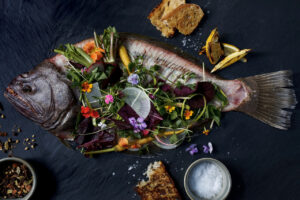
What does the term food sustainability really mean? On the back of recent visits to a resort that fully champions sustainability across all areas of the operation, I decided to do some digging, and interviewed five hotels and restaurants in the UAE and Oman that are leading the sustainable cause. These hoteliers, restaurateurs and chefs have shared their strategies and actions to give us a best practice guide that demystifies this buzz term and explains food sustainability, from their perspectives. We as the consumer have a responsibility to join this journey by embracing these changes, whenever we dine out.
Thank you to Boca, Teible, Hilton Hotels, Sofitel Dubai The Obelisk, and last but not least, Six Senses Zighy Bay, that inspired this article. I know we have many more establishments here that are driving all things sustainability, so please do leave a comment to flag these and their activations.
Boca in DIFC – Omar Shihab, founder & chief sustainability officer.
Sustainability is addressed holistically across five pillars – local produce, waste management, renewable energy, carbon footprint and community – with a Sustainability Manifesto published on Boca’s website. Specifically on the food front, many of the following initiatives have been in place since the 2014 opening.
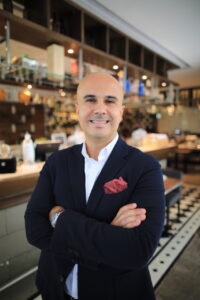
- A restaurant procurement policy that prioritises ingredients sourced locally, followed by regional produce, even if not organic, whilst ensuring traceability and fair payment across the supply chain.
- 80% of fish and seafood are locally or regionally sourced directly from fishermen at Dubai’s Waterfront Market such as kingfish, trevally, sardines and squid – with sustainable seabass and hammour from Fish Farm. Note: the latter is not an endangered species. Boca believes that every tonne of hammour sourced from this farm equates to one tonne that remains in the Arabian Gulf, helping build back the dwindling wild population in the sea.
- The sole oysters on the Boca menu are from Dibba Bay on the east coast of Fujairah.
- 40% of vegetables and fruits are from local organic and hydroponic farms in Abu Dhabi, Al Ain and the Northern Emirates. As an example, all tomatoes are from Pure Harvest Smart Farms.
- Five species of native desert plants, such as khobez, homaid and khansour feature on the menu. Who knew?
- The menu credits local farms, as does the drinks list with sustainable, biodynamic and organic suppliers. A ‘Local Ingredients: An Illustrated Guide’ with original illustrations is attached to the menu.
- Appointment of a full-time, in-house Waste Officer. Food preparation waste has been reduced to 5% through a number of initiatives. Creative methods to introduce food scraps back into menus as new ingredients, e.g. with broths and soups, or by making cheese from excess milk. Stocks are made from all bones, whilst vegetable cuts and peels, and husks of freshly squeezed citrus fruit are used to make cocktail bases in the bar. Mild fermentation for vegetables bought in abundance during season. New initiatives to create sodas from pineapple skins, and brewing kombucha.
- A demand-driven inventory through a ‘Market Availability’ board in the restaurant showcasing dishes to guests that are in limited supply.
- The kitchen limits the quantity of high-cost, short-expiry items on slower days to avoid wastage and freezing of fresh produce.
- Organic waste from prep and guest leftovers are collected by The Waste Lab and transformed into compost here in the UAE.
- Used cooking oil is collected by Neutral Fuels, a local company that recycles waste oil into biodiesel, fuelling trucks on the UAE roads.
- Paper, bamboo and cassava have replaced plastic straws and stirrers. The bamboo straws, reusable up to ten times, are sourced from small farms in the Philippines employing less fortunate families.
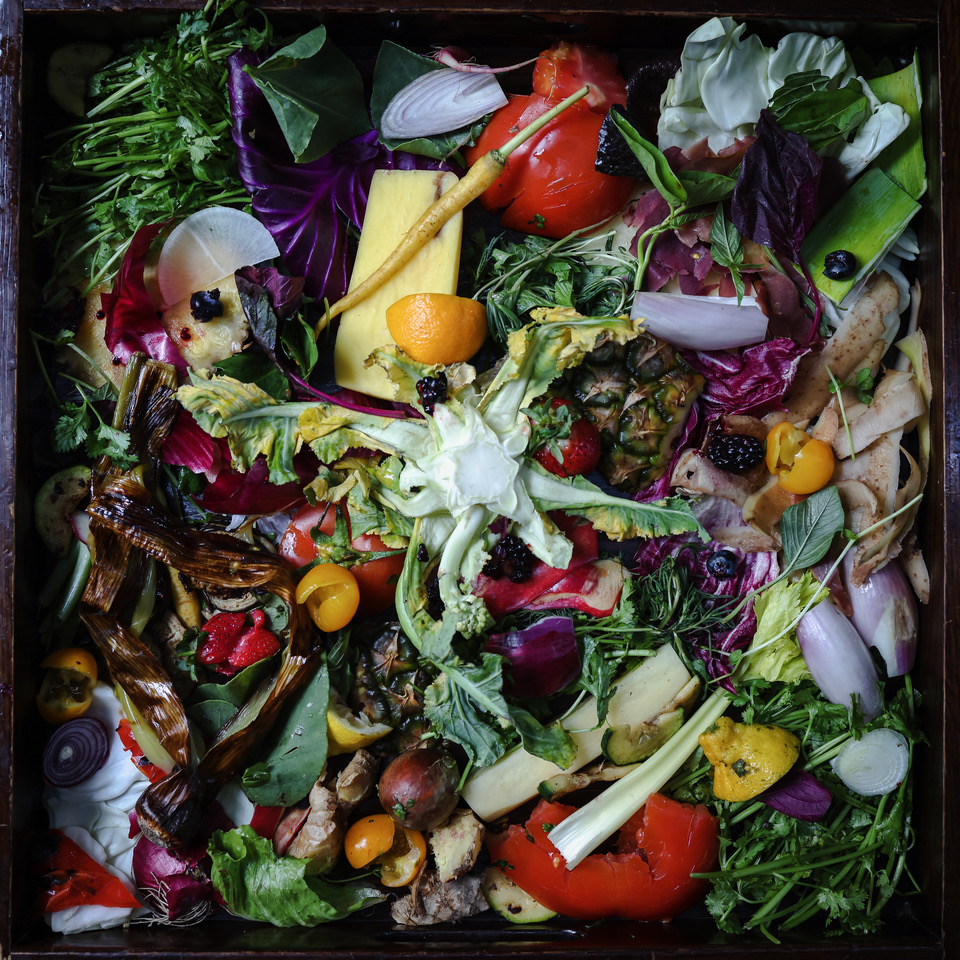
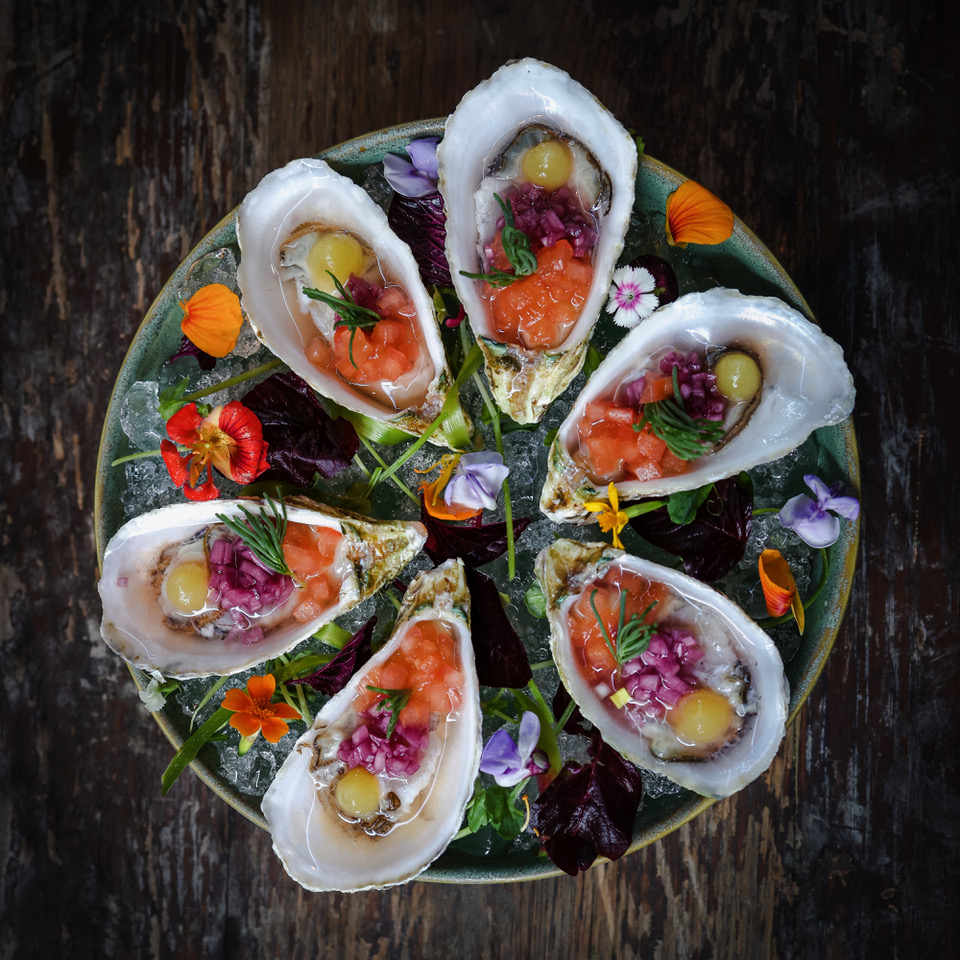
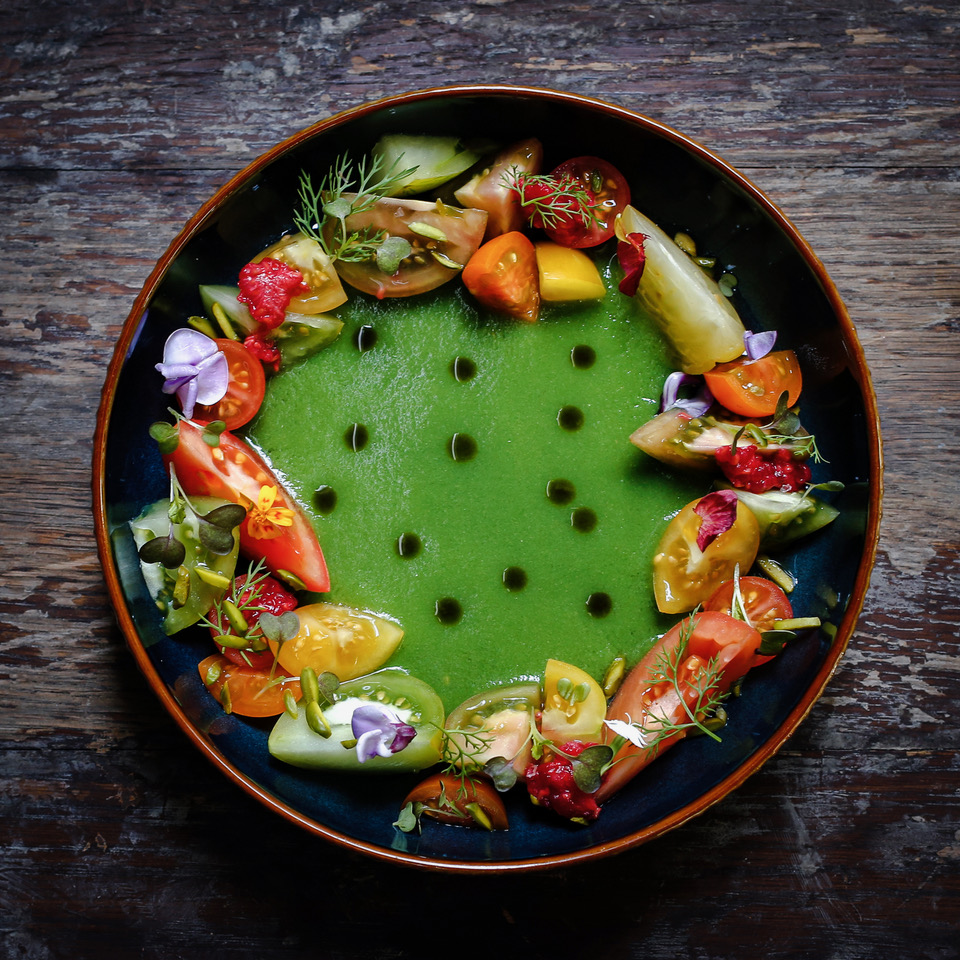
Teible at Jameel Arts Centre – Carlos Frunze Garza, executive chef.
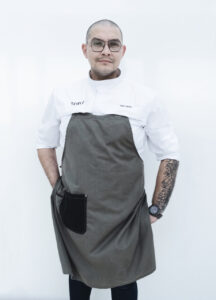
Teible’s ethos, since it opened well over a year ago, is focused on respect for the environment, respect for the way food is generated, and respect for the nourishment to every guest.
- With 90% of farms in the UAE certified as organic, the majority of locally sourced produce is also organic. Even those not certified, have similar environmental goals in producing the highest quality ingredients.
- 80% of produce is locally sourced. Some examples: heirloom tomatoes from Greenheart Organic Farms, butternut squash from Manbat, and beef cuts from Fresh on Table. The menu for the new season celebrates native produce from Manbat, a Ministry of Climate Change & Environment partnership with Arada.
- The remaining 20% is seasonal produce from the wider region of Lebanon, Palestine, Jordan, Egypt and Saudi Arabia.
- Ancient methods of preservation in cooking are combined with modern ways of reusing offcuts to make powders, oils, garums and sauces.
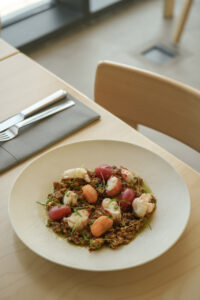
- Operationally, Teible is a zero wastage restaurant. Food scraps like corn husks are used to make corn vinegar; coriander stalks for pesto; fish and chicken bones for fermented bone demi-glace; and peels from fruits for oils.
- However, consumer wastage from diners is an issue, which Teible is addressing with donations to farms for composting.
- Plastic containers have been replaced by metal containers; cling film is recycled; garbage bags are made from recycled material locally; plastic straws and cups are replaced with biodegradable materials; and napkins are made with cloth produced in the UAE.
- From a design perspective, the restaurant’s whole ceiling is produced from recycled materials, whilst the walls are made from date seeds.
Hilton Hotels – Emma Banks, vice president, F&B strategy & development, EMEA.

With the food industry accounting for 30% of global carbon emissions, Hilton has made a commitment to reduce the impact with a significant investment in the local economy. Emma believes that to act global, one has to think local. For instance, local produce improves and the cost decreases for all – so it is a win for the planet, and a win for the people.
- Two years ago, Hilton launched a ‘Growth in the UAE’ campaign. For 2022 alone, 446 tonnes of 160 line items were purchased via Fresh On Table (who source from a number of local farms), saving 128 million food miles – the equivalent of powering 1,923 gas cars on the road for one year. For 2023, it is set to double the impact with 31 hotels in the UAE sourcing 900 tonnes of local produce, forecasting a saving of 250 million food miles.
- Produce can be tracked and traced like never before, so procurement can be as responsible as possible, including working with partners who are also transparent about their practices across the value chain. The three most popular ingredients are tomatoes (round and cherry), all the capsicums, and white button mushrooms.
- With the UAE’s arid environment, hydroponics dominate and are termed ‘naturally grown’ versus organic. By sourcing hyper locally, produce is at peak nutrition, flavour and freshness, not to mention the minimised carbon impact.
- A Crysp vertical farm at Conrad Abu Dhabi Etihad Towers, with an additional unit to be installed at Conrad Dubai later this year.
- Food waste is measured and tracked through a Hilton proprietary platform, LightStay – with a 5% per cover reduction of reported wastage across 200 participating hotels in EMEA, including 31 UAE hotels.
- A project with Winnow (an artificial intelligence tool that help chefs run more profitable, sustainable kitchens by cutting food waste) across 21 hotels in 10 different EMEA countries has resulted in annualised savings of 600,000 meals, a 50% food waste-to-landfill reduction (from inventory to plate), and a saving of 100,000 tonnes of carbon emissions in 2021. This programme has now been rolled out to 69 properties and counting.
- A partnership with The Waste Lab in four hotels to compost food waste. As an example, for one small three-day activation at Taste of Dubai, 43kg of soil was saved for composting.
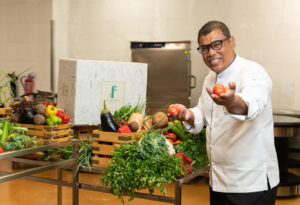
- A recent ‘Green Ramadan’ experiment with Winnow and UNEP West Asia across three key markets of UAE, Qatar and Saudi Arabia, with multiple actions:
- Hotels forensically measured food waste from production to plate.
- #RecipeOfChange #SustainableRamadan messaging to change consumer behaviour.
- Klimato carbon labelling encouraged guests to make climate-smart decisions.
- Partnerships with local farms to source farm-fresh produce.
- Zero waste culinary techniques, such as small portions, freeze-drying and fermentation.
- Plant-based innovation.
- Composting with local partners.
- Donations to local food banks.
- A white paper and a toolkit will be rolled out for other seasonal festivities, conferences and events.
- This year, an EMEA-wide ’50 Mile Menu’ has been introduced for conferences and events as a mandatory KPI for hotel general managers.
- Single use plastics are replaced as much as possible with palmade biodegradeables made from upcycled palm fronds.
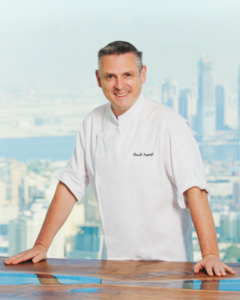
Sofitel Dubai The Obelisk at Wafi – Russell Impiazzi, executive chef.
A behaviour change programme starting with staff is key to this hotel’s food sustainability programme including shaping menu content, menu engineering, and making vegetable-centric dishes with meat as a garnish, whilst giving the term vegan a rebrand. The greatest challenge is taking guests on this journey, and to convince them to embrace change.
- Almost zero food wastage is achieved with the following practices:
- Reduce first through more efficient buying, maximising yield, better planning and recipe management, like using the same ingredient in different ways.
- A ‘Waste Not, Want Not’ menu using items that potentially would go to waste to create simple bar bites and snacks, e.g. potato peelings from 100 kilos of potatoes weekly are used to make complimentary crispy potato bar snacks that replace peanuts in The Nine gastro pub.
- Hotel buffet breakfasts typically generate the highest amount of waste, so a new breakfast standard has been introduced that has reduced plate waste by 40% – monitored by a food waste tracking system, Chefs Eye.
- Old-school cheffing skills are more important than ever using food scraps for stocks, soups and casseroles.
- Food segregation of any scraps, and a partnership with Reloop for collection and composting.
- Cooking oil is converted to biofuel.
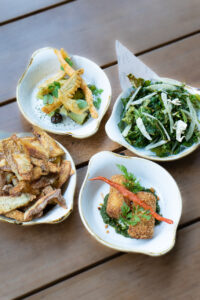
- Production of over 14,000 meals over the last two years for the UAE Food Bank.
- Behaviour change starts in the staff canteen with a ‘No Bin’ policy, and ‘Plant Powered’ Wednesdays.
- The hotel boasts its own bottling plant, with complimentary filtered water in all guest rooms, meeting facilities and restaurants, whilst also avoiding single use plastic bottles.
- A recycling programme that filters all guest rooms with anything that can be recycled.
- In 2022, 25% of produce was locally sourced mostly from organic and hydroponic farms – a figure the hotel is aiming to beat this year. Huge improvements with quality and consistency – however volume can be challenging for hotels.
- Three examples of ingredients from local suppliers: tomatoes from Pure Harvest; heirloom beetroot from Greenheart Organic Farms; berries from Elite Farms.
Six Senses Zighy Bay in Oman – Armand Thieblemont, director of sustainability.
With sustainability at the heart of the Six Senses brand globally, the Zighy Bay resort, a two hour drive from Dubai, runs five different programmes addressing recycling and wastage, food, carbon offsetting, community, education, and the environment.

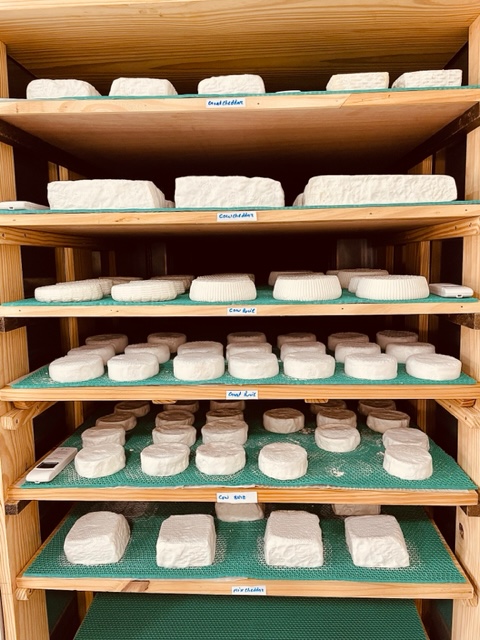
- A staggering six cheeses are made at the resort’s organic farm and dairy in Zighy village using milk from goats and cows, with a couple more under development. A thyme-infused goat’s cheese and a cow’s milk Camembert-style, in particular, are top quality.
- 400 free-range chickens lay eggs providing a chunk of the resort’s requirements.
- The orchard and greenhouse in the organic farm grow 20+ fruits and veggies, shishito peppers included.
- A separate on-site organic garden boasts 20 herbs.
- 90% of seafood is sustainably fished, locally.
- Cold-pressed olive oil is made in-house, as are pomegranate molasses.
- All water for the resort is desalinated and filtered on site.
- A ‘Waste for Wealth’ programme has built two new waste segregation facilities with 36% of total waste diverted from landfill; bread waste feeds the goats; other food waste is used for composting; and all glass is 100% recycled.
- Food scraps and animal manure meet all the composting requirements for the resort and even for the local farms.
- 60% reduction in plastic. Even suppliers have replaced plastic packaging with reusable cooler boxes for transportation.
- 0.5% of the resort’s revenue and 50% of sales from water in F&B outlets (in-room is complimentary) and soft toy sales are donated to a sustainability fund that is reinvested back into the community.
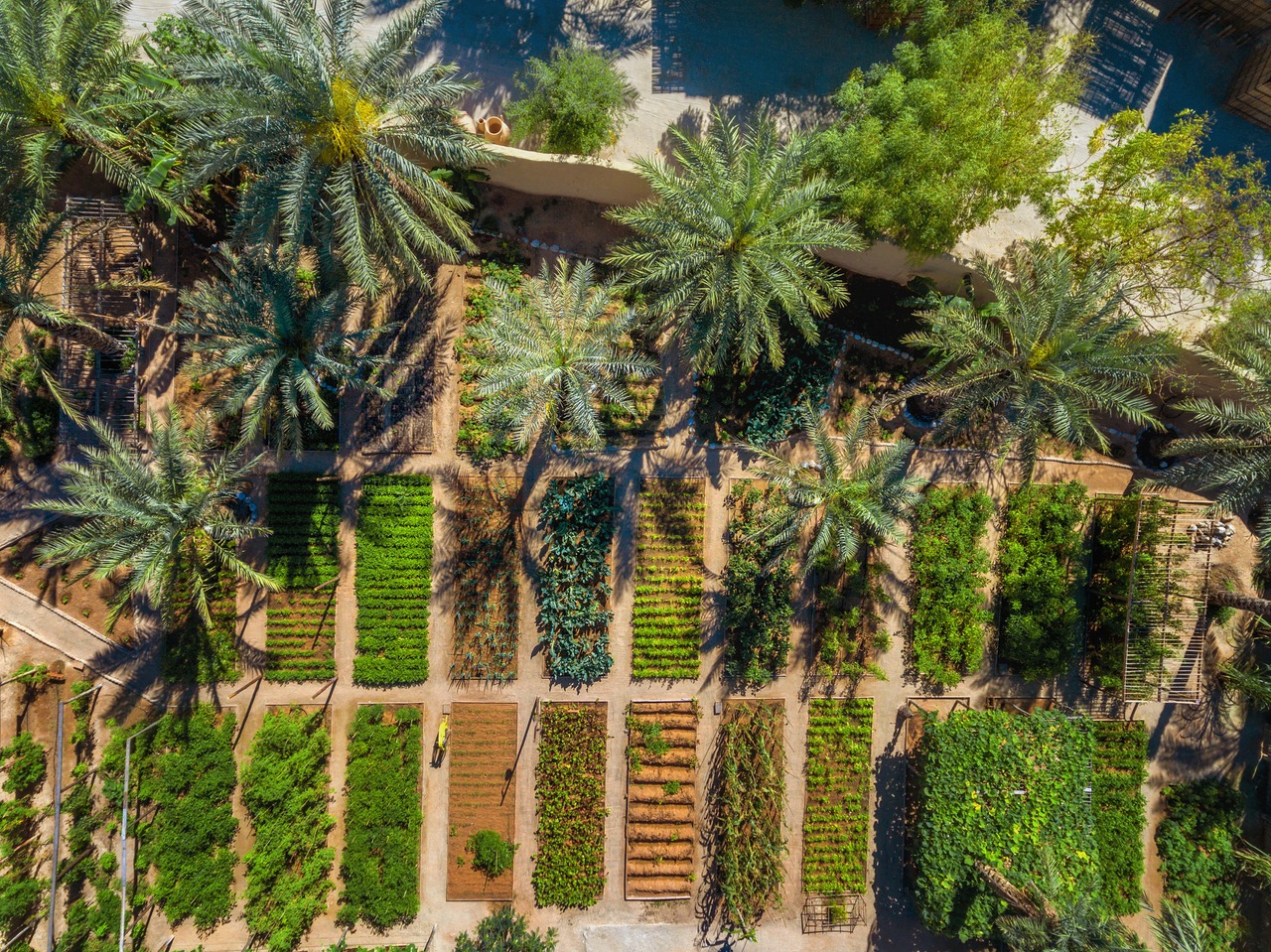
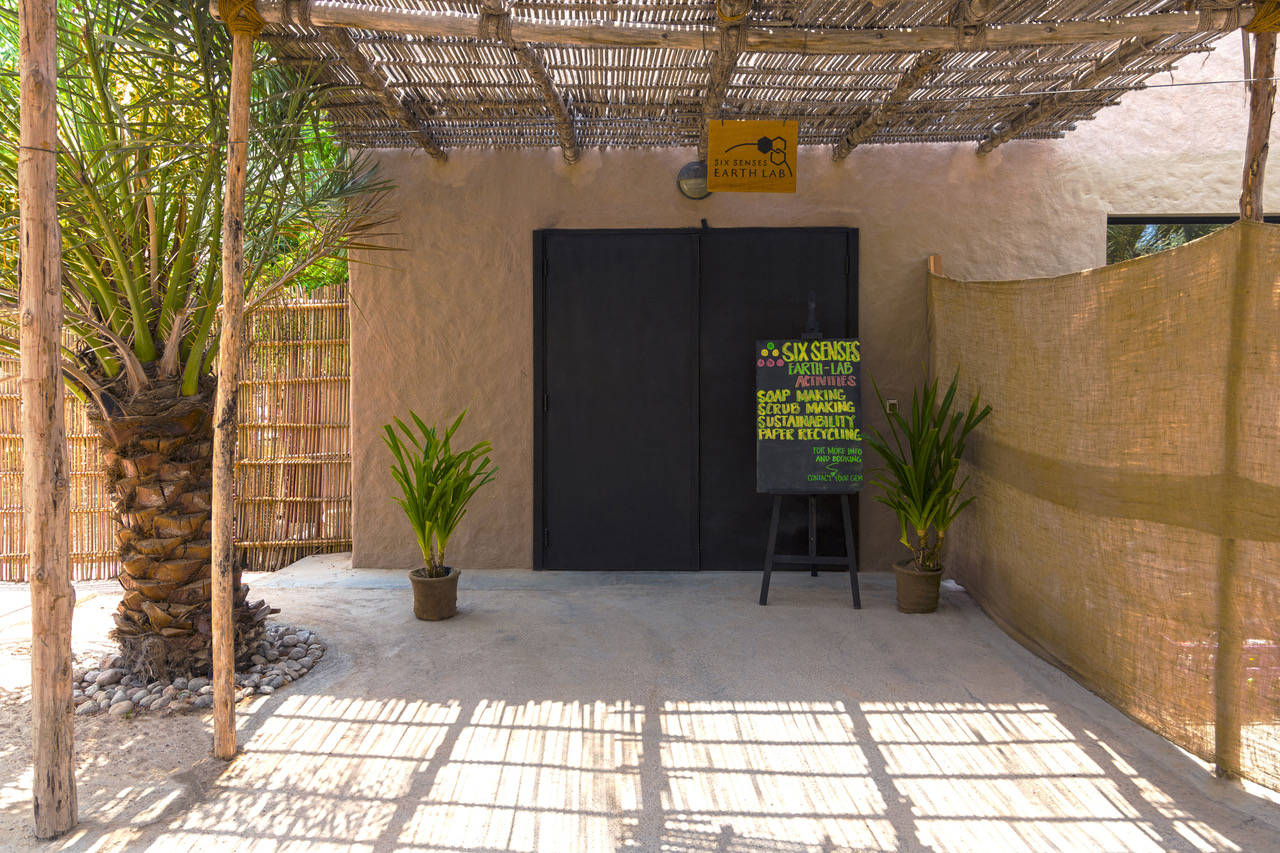
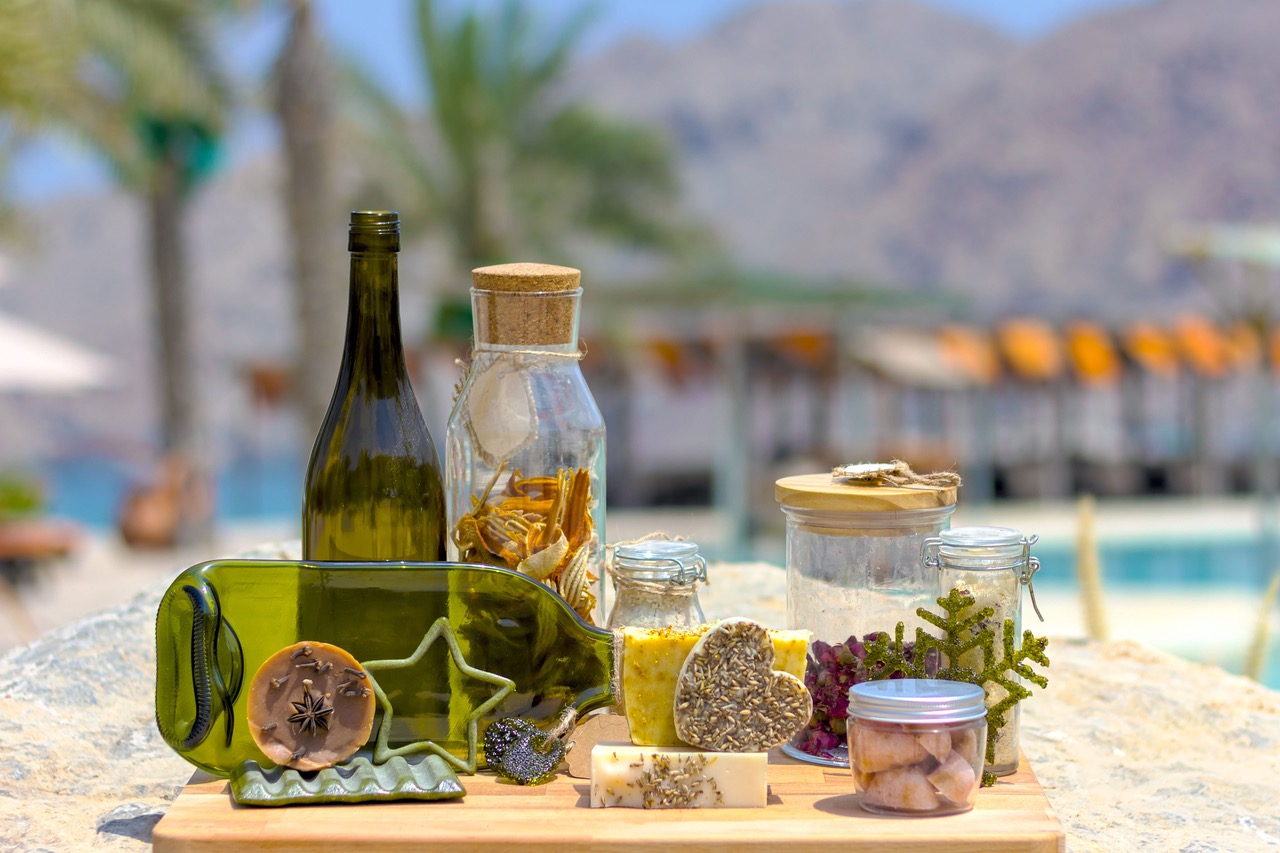
Some additional useful references (credit to Boca).
- DEWA’s Mohammed Bin Rashid Al Maktoum Solar Park feeds electricity into Dubai’s main grid.
- Element Six, a Dubai-based sustainability and carbon management consultancy that calculates carbon emissions.
- International Centre for Biosaline Agriculture incubates species of plants that can sustain and even thrive in arid conditions with high heat and high saline conditions, while producing nutritious grains and vegetables.
- Food Made Good, the world’s largest food service sustainability programme developed by the Sustainable Restaurant Association – covering three pillars of sourcing, society and environment.
A bientôt.
FooDiva. x
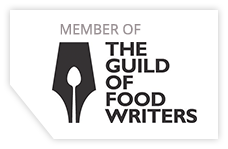

























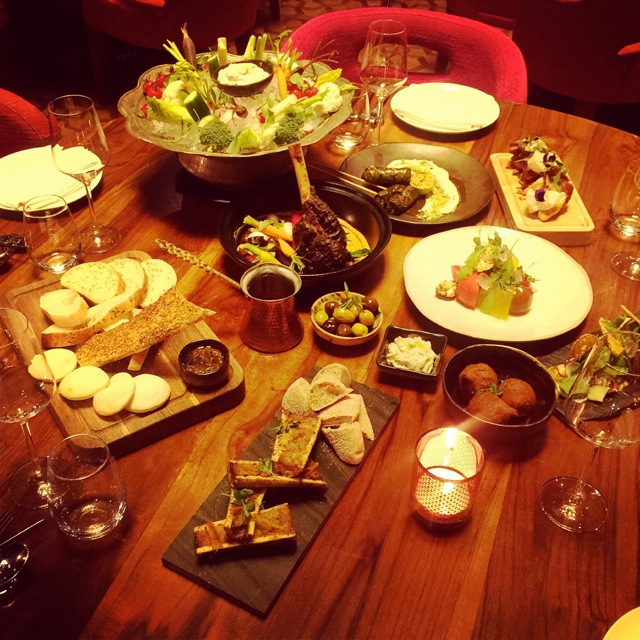
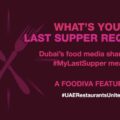
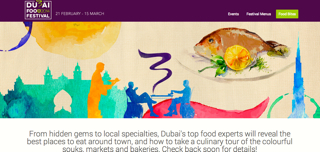
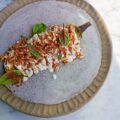

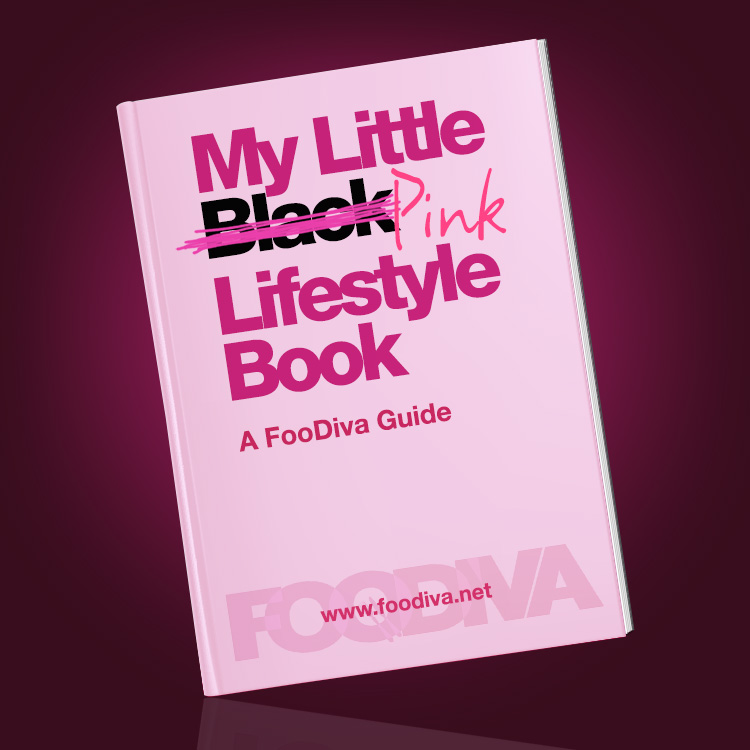
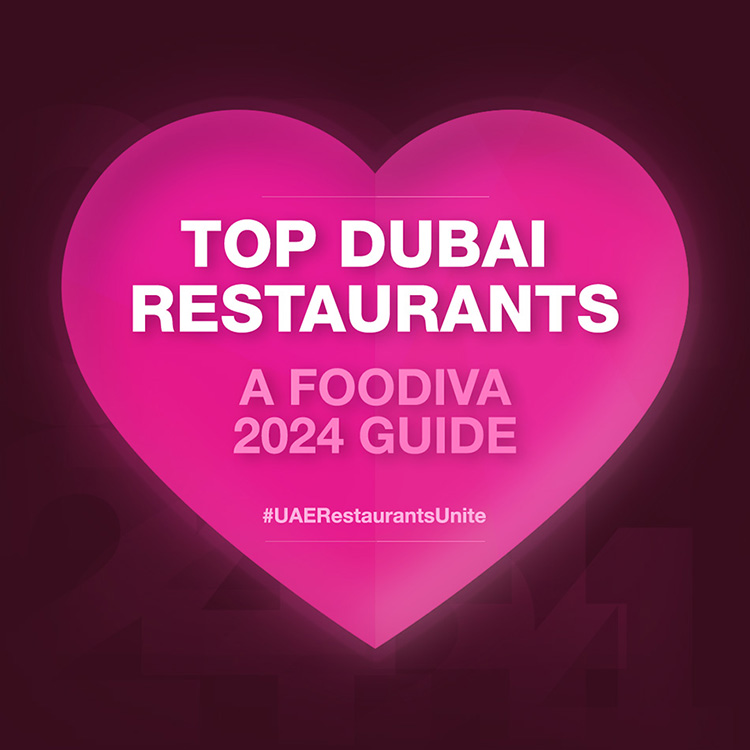
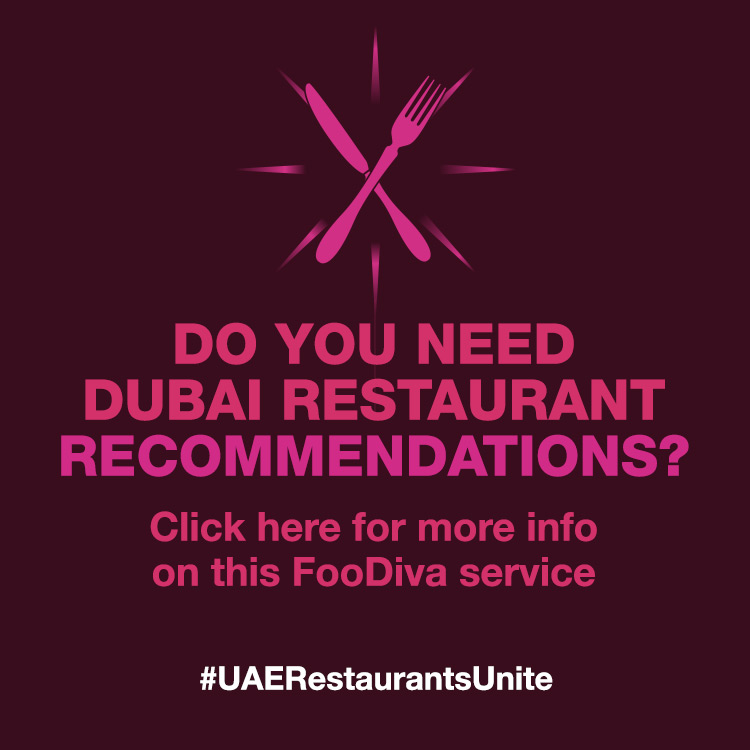



No comments yet